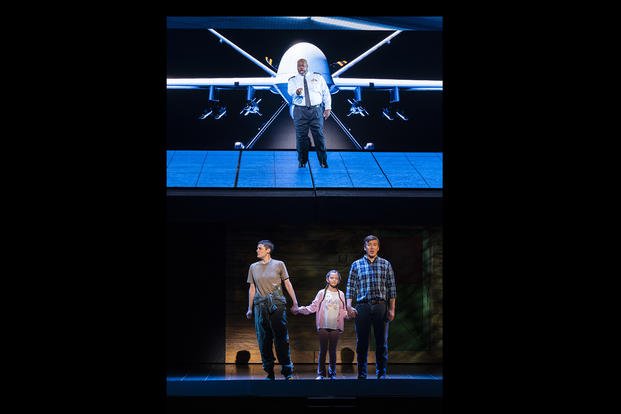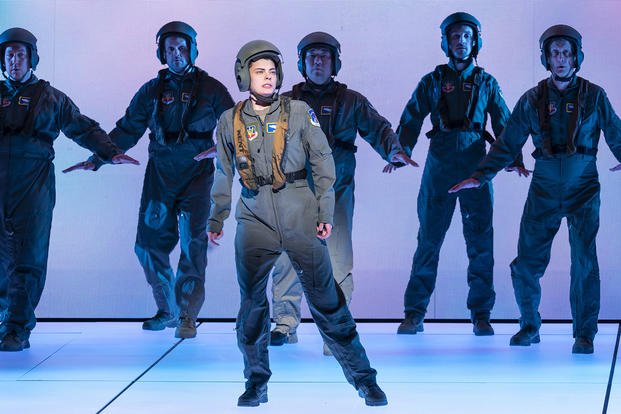When I was first offered a chance to see “Grounded” -- a hot, new opera centered around drone warfare -- I was a bit skeptical. The topic seemed dated, the fine arts typically struggle to capture the complexities of military service, and, frankly, I am hardly an opera connoisseur.
But I was curious and I went -- and what I discovered was a thought-provoking experience that was far more intriguing than I expected.
When the curtain went up at Washington, D.C.'s John F. Kennedy Center for the Performing Arts one weekend in early November and a chorus of flight-suited singers walked out onto a stage of giant screens showing a swirling sky, I suspected that “Grounded” would be something different. Then there was the earnest, if slightly goofy hookup scene on stage. Different indeed. By the time the opera's main character belted out her first F-bomb in a perfectly pitched mezzo-soprano voice, I was totally engrossed.
The plot of the opera follows the journey of Jess, an Air Force F-16 fighter pilot flying combat missions in the skies over Iraq. However, a visit to a bar with her squadron buddies while on leave leads to a chance meeting with Eric, a rancher; the two hit it off and end up sleeping together in the aforementioned hookup scene, which had Jess and Eric stripping down to their underwear and hopping into a bed at the corner of the stage.
Jess ends up returning to flying missions, but soon discovers that she is pregnant. She decides to ditch flying and have the child, a daughter she and Eric name Sam. But after eight years of family life and raising her daughter, Jess wants to get back to flying, only to find that the Air Force isn’t interested in putting her back in the cockpit of an F-16. Instead, she is told she will fly drones from a trailer just outside Las Vegas.
Jess’ experiences flying drones make up the bulk of the opera’s drama and thought-provoking themes as she spends the entire second act hunting a high-value target in the Middle East. The opera explores both the moral complexities and psychological impacts of drone warfare by juxtaposing the fact that Jess is never far from her family -- pitched to her as a huge positive -- with the fact that she can’t shake the cold, calculating and detached nature of her job.
George Brant, the dramatist behind “Grounded,” said he first wrote the story in 2011, around that time during the first term of President Barack Obama that drone warfare, along with its problems and costs, was beginning to become a subject of public concern.
The result is that the characters in the opera talk about their work in a way that is surprisingly precise and technical. The chorus sings about dropping Hellfire missiles and the trainer who introduces Jess to her MQ-9 Reaper drone excitedly touts the “Gorgon’s Stare” – a special 12 camera sensor that was rolled out for the platform around 2010. The cast also includes five members of the kill chain, two of whom always sit behind Jess and her sensor operator as they fly their drone.
“This is the terminology that these characters live in and breathe,” Brant told Military.com in an interview last week. “It was important to me for that to be their language and not to clean it up too much.”
The opera’s attention to detail extends down to minute costume choices. For example, Jess’ flight suit features a patch for the 432nd Wing, the unit that first flew drones for the Air Force and operator Reapers and MQ-1 Predators out of Creech Air Force Base just outside Las Vegas. Jess also wears a patch from Air Combat Command, the command that oversees the 432nd Wing.

The production consulted with retired Brig. General Kenneth Todorov, a command pilot for the Air Force who flew more than 4,000 hours in a variety of helicopters, to help with the accuracy.
“I was impressed with how, even though this is a work of art, that the production team … it was important for them to ‘get it right,’” Todorov told Military.com in a phone call. “They knew that veterans would be watching and, to some extent, critiquing and evaluating, and if they didn't have some semblance of realism in their work of art, I think it would be discounted.”
All of that accuracy is in service of the opera’s weighty themes.The production certainly compels the audience to consider the ethics and nature of drone warfare and the morality of condemning a target to death, based largely on what a team of service members sees on a screen thousands of miles away in a stateside trailer.
In the opera's second act, Jess is in the thick of her new career as a drone operator and is regularly taking out targets. Some of the details that she sings about -- like watching a target’s heat signature slowly cool to match the ground they’re dying on -- mirror accounts from actual pilots from news articles written a decade ago.
In all this accuracy and detail of drone warfare, it is easy to think that is the work’s only message -- one that has unfortunately come and gone in the national consciousness. While profiles of drone operators or investigations into the consequences of U.S. strikes have cropped up with some regularity throughout the last decade, these stories have all but disappeared from daily news headlines.
“The topics have been around for a while, but I personally don't feel like we've had, as a country, a real big conversation or about how and when these [drones] should be used and about the pilots flying them,” Brant said.
To be fair, the role that drones and unmanned aerial vehicles play in warfare has recently cropped up as a specter in far more high-profile and mainstream works of art, too -- namely “Top Gun: Maverick.” But to Brant, the work’s message goes deeper than casting drones as a nefarious force. He notes that his work also touches on how everpresent surveillance has become a topic that’s not just present on the battlefield, but it’s a growing force in everyday life, too.
Meanwhile, Todorov notes that Jess is much more of an avatar for combat veterans writ large than just drone operators. Indeed, much of the second act shows Jess struggling with everyday life and growing more and more detached from her family as they adjust to her new posting outside Las Vegas. Eric leaves his ranch behind and takes a job as a blackjack dealer -- a nod toward the underemployment that faces so many military spouses. When he tries to get Jess to open up and asks about her day at work, all he gets is a line many military spouses know too well: “It’s classified.”
Meanwhile, Jess develops panic attacks as the lines between war and home blur. She starts refusing to take off her flight suit at home, she fixates on the security cameras at the shopping mall, and the desert of Nevada and the Middle East start to look more and more similar to her.
Jess’ story “represents a whole host of veterans and veteran communities who have experienced trauma in combat … and that the sort of the mental war that wages during and, particularly, after for years and years to come,” Todorov said. “It could have easily been an opera about an infantryman going house to house in Fallujah.”
Like many operas, Jess’ story ends in tragedy. When she finally catches up with the target she was ordered to kill, she’s only able to make a positive identification when he steps out of his car to wave away a little girl. Seeing Sam in the girl’s place, Jess crashes her drone in an effort to save her, only for another drone to take the shot instead.

It's a powerful moment that is made possible by the unique stage that much of the show takes place on -- large video screens that envelop Jess and her drone team, constantly showing the audience a stylized feed from the drone’s camera. As Jess’ perspective on the world becomes more fractured, so does the video. In those last moments before she crashes her drone, the screens instead show Sam -- and then static.
Both Todorov and Brant say that the reactions they’ve heard to the work have been overwhelmingly positive, spurring debate and conversations among audience members. But both saw the real value of the work as bringing the story of the stress, struggles and lives of U.S. military veterans to an audience that has not had an opportunity to hear about it before.
“I've had the opportunity to speak to…some former drone pilots who really seemed grateful to have their story reflected … [and] like it mattered enough to be the subject of what might be seen as the grand opera,” Brant said.
“I think it is really a great achievement for the production that it connected those who might not be familiar with [the stress and consequences of military service] or might take it for granted,” Todorov said. “It was really enlightening to have so many people come up to me afterwards and say, ‘Wow, we had no idea,’ and they'd ask me questions like, ‘Was that really how it is?’”
“Grounded” will move to New York City’s Metropolitan Opera next year.
-- Konstantin Toropin can be reached at konstantin.toropin@military.com. Follow him on X at @ktoropin.

















